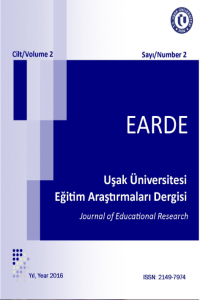The Effects Of Teaching Fractions By Using Concept Map On The Achievement Of Sixth Grade Students
Öz
The aim of this study is to investigate the effects of using concept maps on the mathematics classes achievement of students. The sample consists of 71 students, who are in two sixth grade classes at a Secondary School in Turkey. One of the sixth grade classes was used as the experimental group and the other one as the control group. The equality of the groups was determined by t-test analysis on a pre-test. The research was carried out over four weeks. The control group studied with conventional teaching methods and the experimental group studied with a teaching method including the use of concept map. Achievment Test was used us a data source and t-test was used to evaluate the hypothesis. Results showed there was a significant difference between the control and experimental group based on results of the achievement post test. The experimental group was more successful than the control group, p=.000 (p<.05). Based on this results we concluded the teaching the subject “fractions” through the use of concept map increase the knowledge of fractions.
Anahtar Kelimeler
Kaynakça
- Ausubel, D. P. (1960). The use of advance organizers in the learning and retention of meaningful verbal materials. Journal of Educational Psychology, 51(5), 267-272.
- Ausubel, D.P. (1968). Educational Psychology: A Cognitive View. New York Holt, Rinehart and Winston.
- Bayındır, P. (2006). İlköğretim Altıncı Sınıf Sosyal Bilgiler Dersi Coğrafya Konularında Kavram Haritalarının Öğrenci Başarısına Etkisi (Erzurum İli Ömer Nasuhi Bilmen İlköğretim Okulu Örneği), Yüksek Lisans Tezi, Atatürk Üniversitesi, Sosyal Bilimler Enstitüsü, İlköğretim Anabilim Dalı.
- Baykul, Y. (2003). “Matematik Öğretimi ve Bazı Sorunlar.” www.matder.org.tr adresinden 20 Temmuz 2007 tarihinde alınmıştır.
- Bayram, H., Salan, Ü., Gürdal, A. (1999). “Stokiyometrik Problemlerin Çözümlerinde Kavram Haritalarının Başarıya Etkisi.” II. Ulusal Eğitim Sempozyumu. Marmara Üniversitesi. İstanbul.
- Duru, K. M. (2001). İlköğretim Fen Bilgisi Dersinde Kavram Haritasıyla ve Gruplara Kavram Haritası Çizdirilerek Öğretimin Öğrenci Başarısına ve Hatırlamaya Etkisi. Yüksek Lisans Tezi. Marmara Üniversitesi, Eğitim Bilimleri Enstitüsü, İlköğretim Anabilim Dalı, Fen Bilgisi Eğitimi Programı.
- Erdoğan, A. (2007). Kavram Haritalarının Calculus Öğretiminde Kullanılması. Doktora Tezi. Selçuk Üniversitesi, Fen Bilimleri Enstitüsü.
- Horton, P. and Başk. (1991). An Investigation of the effectiveness of concept mapping as an Instructional Tool. Science Education. I (77), 95–111.
- Kabaca, T. (2002). Orta Öğretim Matematik Eğitiminde Kavram Haritalanması Tekniğinin Kullanımı. Yüksek Lisans Tezi. Marmara Üniversitesi, Fen Bilimleri Enstitüsü, Orta Öğretim Fen ve Matematik Alanları, Eğitimi Ana Bilim Dalı, Matematik Eğitimi Programı.
- Kaptan, F. (1998). Fen Bilgisi Öğretimi. Anı Yayıncılık.
- Novak, J.D. and Gowin, D.B. (1984). Learning How to Learn. Cambridge University Press: New York.
- Novak, J.D., (1990). Concept Mapping: A Usefool Tool for Science Education, Journal of Research in Science Teaching, 27:10, pp. 937–949.
- Novak, J. D. & A. J. Cañas, (2008). The Theory Underlying Concept Maps and How to Construct and Use Them, Technical Report IHMC CmapTools 2006-01 Rev 01-2008, Florida Institute for Human and Machine Cognition.
- Persall, N.R., Skipper, J., Mintzess, J. (1997). “Knowledge Restructuring in the Life Sciences: A Longitudinal Study of Conceptual Change in Biology”, Science Education, V:81, N:2.
- Wallace, J., Mintzes, J. (1990). “The Concept Map As A Research Tool: Exploring, Conceptual Change in Biology”. Journal of Research in Science Teaching, s.27, ss.1033-1052.
Ayrıntılar
| Birincil Dil | Türkçe |
|---|---|
| Bölüm | Makaleler |
| Yazarlar | |
| Yayımlanma Tarihi | 19 Nisan 2016 |
| Gönderilme Tarihi | 25 Şubat 2016 |
| Yayımlandığı Sayı | Yıl 2016 Cilt: 2 Sayı: 2 |



Uşak Üniversitesi Eğitim Araştırmaları Dergisinde yayımlanan makaleler, Creative Commons Atıf 4.0 Uluslararası Lisansı (CC BY 4.0) ile lisanslanmıştır.


